Top 10 Nobel Peace Prize Laureates
The Nobel Peace Prize laureates are a diverse group of individuals and organizations who've dedicated themselves to resolving conflicts, promoting human rights, and advancing the cause of peace. From activists to politicians, scientists to religious leaders, they've all left their unique stamp on history.The Top Ten
1 Martin Luther King Jr.
 Martin Luther King Jr. was awarded the Nobel Peace Prize in 1964 for his nonviolent struggle against racial segregation and for peace. His leadership during the American civil rights movement profoundly changed the trajectory of social justice in the United States.
Martin Luther King Jr. was awarded the Nobel Peace Prize in 1964 for his nonviolent struggle against racial segregation and for peace. His leadership during the American civil rights movement profoundly changed the trajectory of social justice in the United States.
 Martin Luther King Jr. was awarded the Nobel Peace Prize in 1964 for his nonviolent struggle against racial segregation and for peace. His leadership during the American civil rights movement profoundly changed the trajectory of social justice in the United States.
Martin Luther King Jr. was awarded the Nobel Peace Prize in 1964 for his nonviolent struggle against racial segregation and for peace. His leadership during the American civil rights movement profoundly changed the trajectory of social justice in the United States.
2 Mother Teresa
 Mother Teresa received the Nobel Peace Prize in 1979 in recognition of her work in overcoming poverty and distress, which also constitutes a threat to peace. She founded the Missionaries of Charity in Kolkata, India, which by the time of her death had over 4,000 sisters operating in 123 countries.
Mother Teresa received the Nobel Peace Prize in 1979 in recognition of her work in overcoming poverty and distress, which also constitutes a threat to peace. She founded the Missionaries of Charity in Kolkata, India, which by the time of her death had over 4,000 sisters operating in 123 countries.
 Mother Teresa received the Nobel Peace Prize in 1979 in recognition of her work in overcoming poverty and distress, which also constitutes a threat to peace. She founded the Missionaries of Charity in Kolkata, India, which by the time of her death had over 4,000 sisters operating in 123 countries.
Mother Teresa received the Nobel Peace Prize in 1979 in recognition of her work in overcoming poverty and distress, which also constitutes a threat to peace. She founded the Missionaries of Charity in Kolkata, India, which by the time of her death had over 4,000 sisters operating in 123 countries.
3 Nelson Mandela
 Nelson Mandela was honored with the Nobel Peace Prize in 1993 jointly with Frederik Willem de Klerk for their work for the peaceful termination of the apartheid regime, and for laying the foundations for a new democratic South Africa. Mandela's leadership as the first black President of South Africa was instrumental in establishing racial reconciliation.
Nelson Mandela was honored with the Nobel Peace Prize in 1993 jointly with Frederik Willem de Klerk for their work for the peaceful termination of the apartheid regime, and for laying the foundations for a new democratic South Africa. Mandela's leadership as the first black President of South Africa was instrumental in establishing racial reconciliation.
 Nelson Mandela was honored with the Nobel Peace Prize in 1993 jointly with Frederik Willem de Klerk for their work for the peaceful termination of the apartheid regime, and for laying the foundations for a new democratic South Africa. Mandela's leadership as the first black President of South Africa was instrumental in establishing racial reconciliation.
Nelson Mandela was honored with the Nobel Peace Prize in 1993 jointly with Frederik Willem de Klerk for their work for the peaceful termination of the apartheid regime, and for laying the foundations for a new democratic South Africa. Mandela's leadership as the first black President of South Africa was instrumental in establishing racial reconciliation.
4 Barack Obama
 Barack Obama was awarded the Nobel Peace Prize in 2009, early in his first term as President of the United States, for his extraordinary efforts to strengthen international diplomacy and cooperation between peoples. The committee particularly highlighted his vision and work for a world without nuclear weapons.
Barack Obama was awarded the Nobel Peace Prize in 2009, early in his first term as President of the United States, for his extraordinary efforts to strengthen international diplomacy and cooperation between peoples. The committee particularly highlighted his vision and work for a world without nuclear weapons.
 Barack Obama was awarded the Nobel Peace Prize in 2009, early in his first term as President of the United States, for his extraordinary efforts to strengthen international diplomacy and cooperation between peoples. The committee particularly highlighted his vision and work for a world without nuclear weapons.
Barack Obama was awarded the Nobel Peace Prize in 2009, early in his first term as President of the United States, for his extraordinary efforts to strengthen international diplomacy and cooperation between peoples. The committee particularly highlighted his vision and work for a world without nuclear weapons.
5 Malala Yousafzai
 Malala Yousafzai became the youngest Nobel Peace Prize Laureate in 2014, recognized for her struggle against the suppression of children and young people and for the right of all children to education. Surviving an assassination attempt by the Taliban, she has continued to advocate for education, especially for girls, worldwide.
Malala Yousafzai became the youngest Nobel Peace Prize Laureate in 2014, recognized for her struggle against the suppression of children and young people and for the right of all children to education. Surviving an assassination attempt by the Taliban, she has continued to advocate for education, especially for girls, worldwide.
 Malala Yousafzai became the youngest Nobel Peace Prize Laureate in 2014, recognized for her struggle against the suppression of children and young people and for the right of all children to education. Surviving an assassination attempt by the Taliban, she has continued to advocate for education, especially for girls, worldwide.
Malala Yousafzai became the youngest Nobel Peace Prize Laureate in 2014, recognized for her struggle against the suppression of children and young people and for the right of all children to education. Surviving an assassination attempt by the Taliban, she has continued to advocate for education, especially for girls, worldwide.
6 Desmond Tutu
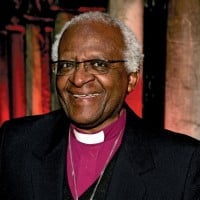 Desmond Tutu, awarded the Nobel Peace Prize in 1984, played a pivotal role in the struggle against apartheid in South Africa. As the Anglican Archbishop of Cape Town, he was a vocal and symbolic figure in the movement towards racial equality and reconciliation in his country.
Desmond Tutu, awarded the Nobel Peace Prize in 1984, played a pivotal role in the struggle against apartheid in South Africa. As the Anglican Archbishop of Cape Town, he was a vocal and symbolic figure in the movement towards racial equality and reconciliation in his country.
 Desmond Tutu, awarded the Nobel Peace Prize in 1984, played a pivotal role in the struggle against apartheid in South Africa. As the Anglican Archbishop of Cape Town, he was a vocal and symbolic figure in the movement towards racial equality and reconciliation in his country.
Desmond Tutu, awarded the Nobel Peace Prize in 1984, played a pivotal role in the struggle against apartheid in South Africa. As the Anglican Archbishop of Cape Town, he was a vocal and symbolic figure in the movement towards racial equality and reconciliation in his country.
7 Aung San Suu Kyi
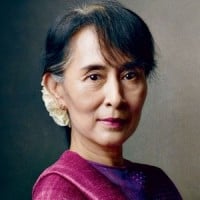 Aung San Suu Kyi was awarded the Nobel Peace Prize in 1991 while under house arrest, recognized for her non-violent struggle for democracy and human rights in Myanmar. She became an emblematic figure of peaceful resistance against dictatorship.
Aung San Suu Kyi was awarded the Nobel Peace Prize in 1991 while under house arrest, recognized for her non-violent struggle for democracy and human rights in Myanmar. She became an emblematic figure of peaceful resistance against dictatorship.
 Aung San Suu Kyi was awarded the Nobel Peace Prize in 1991 while under house arrest, recognized for her non-violent struggle for democracy and human rights in Myanmar. She became an emblematic figure of peaceful resistance against dictatorship.
Aung San Suu Kyi was awarded the Nobel Peace Prize in 1991 while under house arrest, recognized for her non-violent struggle for democracy and human rights in Myanmar. She became an emblematic figure of peaceful resistance against dictatorship.
8 14th Dalai Lama
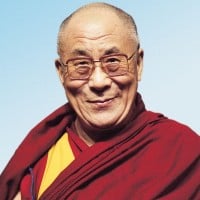 The Dalai Lama, Tenzin Gyatso, was awarded the Nobel Peace Prize in 1989 for his non-violent struggle for the liberation of Tibet. He has consistently advocated for peace and non-violence, even in the face of great adversity.
The Dalai Lama, Tenzin Gyatso, was awarded the Nobel Peace Prize in 1989 for his non-violent struggle for the liberation of Tibet. He has consistently advocated for peace and non-violence, even in the face of great adversity.
 The Dalai Lama, Tenzin Gyatso, was awarded the Nobel Peace Prize in 1989 for his non-violent struggle for the liberation of Tibet. He has consistently advocated for peace and non-violence, even in the face of great adversity.
The Dalai Lama, Tenzin Gyatso, was awarded the Nobel Peace Prize in 1989 for his non-violent struggle for the liberation of Tibet. He has consistently advocated for peace and non-violence, even in the face of great adversity.
9 Henry Dunant
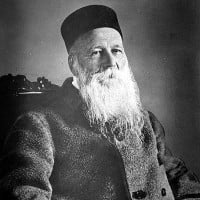 Henry Dunant, one of the founders of the International Red Cross, was awarded the first Nobel Peace Prize in 1901. His experiences and efforts led to the Geneva Conventions, fundamentally changing the treatment of wartime victims.
Henry Dunant, one of the founders of the International Red Cross, was awarded the first Nobel Peace Prize in 1901. His experiences and efforts led to the Geneva Conventions, fundamentally changing the treatment of wartime victims.
 Henry Dunant, one of the founders of the International Red Cross, was awarded the first Nobel Peace Prize in 1901. His experiences and efforts led to the Geneva Conventions, fundamentally changing the treatment of wartime victims.
Henry Dunant, one of the founders of the International Red Cross, was awarded the first Nobel Peace Prize in 1901. His experiences and efforts led to the Geneva Conventions, fundamentally changing the treatment of wartime victims.
10 Bertha von Suttner
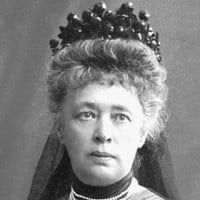 Bertha von Suttner was the first woman to be awarded the Nobel Peace Prize, receiving the honor in 1905 for her authorship of the influential anti-war novel "Lay Down Your Arms" and her leading role in the peace movement. Her efforts laid foundational work for the peace activism and pacifism that followed.
Bertha von Suttner was the first woman to be awarded the Nobel Peace Prize, receiving the honor in 1905 for her authorship of the influential anti-war novel "Lay Down Your Arms" and her leading role in the peace movement. Her efforts laid foundational work for the peace activism and pacifism that followed.
 Bertha von Suttner was the first woman to be awarded the Nobel Peace Prize, receiving the honor in 1905 for her authorship of the influential anti-war novel "Lay Down Your Arms" and her leading role in the peace movement. Her efforts laid foundational work for the peace activism and pacifism that followed.
Bertha von Suttner was the first woman to be awarded the Nobel Peace Prize, receiving the honor in 1905 for her authorship of the influential anti-war novel "Lay Down Your Arms" and her leading role in the peace movement. Her efforts laid foundational work for the peace activism and pacifism that followed.The Contenders
11 Lech Walesa
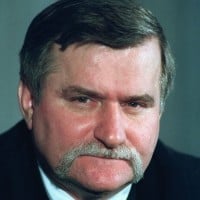 Lech Walesa was awarded the Nobel Peace Prize in 1983 for his role as a founder of Solidarity, the Soviet bloc's first independent trade union, and his work leading to the peaceful dismantlement of the communist regime in Poland. His efforts were pivotal in the fight for freedom and human rights, inspiring movements across Eastern Europe.
Lech Walesa was awarded the Nobel Peace Prize in 1983 for his role as a founder of Solidarity, the Soviet bloc's first independent trade union, and his work leading to the peaceful dismantlement of the communist regime in Poland. His efforts were pivotal in the fight for freedom and human rights, inspiring movements across Eastern Europe.
 Lech Walesa was awarded the Nobel Peace Prize in 1983 for his role as a founder of Solidarity, the Soviet bloc's first independent trade union, and his work leading to the peaceful dismantlement of the communist regime in Poland. His efforts were pivotal in the fight for freedom and human rights, inspiring movements across Eastern Europe.
Lech Walesa was awarded the Nobel Peace Prize in 1983 for his role as a founder of Solidarity, the Soviet bloc's first independent trade union, and his work leading to the peaceful dismantlement of the communist regime in Poland. His efforts were pivotal in the fight for freedom and human rights, inspiring movements across Eastern Europe.
12 George C. Marshall
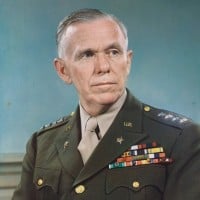 George C. Marshall received the Nobel Peace Prize in 1953 for his role in developing the Marshall Plan, a comprehensive program for the economic recovery of war-torn Europe. As U.S. Secretary of State, his vision was instrumental in rebuilding Europe and ensuring peace and stability post-World War II.
George C. Marshall received the Nobel Peace Prize in 1953 for his role in developing the Marshall Plan, a comprehensive program for the economic recovery of war-torn Europe. As U.S. Secretary of State, his vision was instrumental in rebuilding Europe and ensuring peace and stability post-World War II.
 George C. Marshall received the Nobel Peace Prize in 1953 for his role in developing the Marshall Plan, a comprehensive program for the economic recovery of war-torn Europe. As U.S. Secretary of State, his vision was instrumental in rebuilding Europe and ensuring peace and stability post-World War II.
George C. Marshall received the Nobel Peace Prize in 1953 for his role in developing the Marshall Plan, a comprehensive program for the economic recovery of war-torn Europe. As U.S. Secretary of State, his vision was instrumental in rebuilding Europe and ensuring peace and stability post-World War II.
13 Fridtjof Nansen
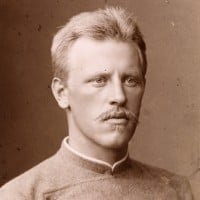 Fridtjof Nansen was awarded the Nobel Peace Prize in 1922 for his work in aiding refugees displaced by World War I and the subsequent Russian Revolution. His innovative Nansen passport for stateless refugees was a groundbreaking effort in international humanitarian law.
Fridtjof Nansen was awarded the Nobel Peace Prize in 1922 for his work in aiding refugees displaced by World War I and the subsequent Russian Revolution. His innovative Nansen passport for stateless refugees was a groundbreaking effort in international humanitarian law.
 Fridtjof Nansen was awarded the Nobel Peace Prize in 1922 for his work in aiding refugees displaced by World War I and the subsequent Russian Revolution. His innovative Nansen passport for stateless refugees was a groundbreaking effort in international humanitarian law.
Fridtjof Nansen was awarded the Nobel Peace Prize in 1922 for his work in aiding refugees displaced by World War I and the subsequent Russian Revolution. His innovative Nansen passport for stateless refugees was a groundbreaking effort in international humanitarian law.
14 Willy Brandt
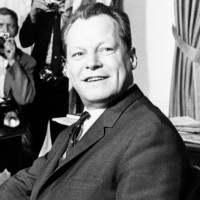 Willy Brandt, the Chancellor of West Germany, received the Nobel Peace Prize in 1971 for his Ostpolitik policy, aimed at improving relations with East Germany, Poland, and the Soviet Union. His efforts significantly contributed to the easing of Cold War tensions in Europe.
Willy Brandt, the Chancellor of West Germany, received the Nobel Peace Prize in 1971 for his Ostpolitik policy, aimed at improving relations with East Germany, Poland, and the Soviet Union. His efforts significantly contributed to the easing of Cold War tensions in Europe.
 Willy Brandt, the Chancellor of West Germany, received the Nobel Peace Prize in 1971 for his Ostpolitik policy, aimed at improving relations with East Germany, Poland, and the Soviet Union. His efforts significantly contributed to the easing of Cold War tensions in Europe.
Willy Brandt, the Chancellor of West Germany, received the Nobel Peace Prize in 1971 for his Ostpolitik policy, aimed at improving relations with East Germany, Poland, and the Soviet Union. His efforts significantly contributed to the easing of Cold War tensions in Europe.
15 Albert Schweitzer
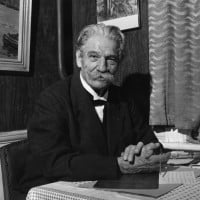 Albert Schweitzer was awarded the Nobel Peace Prize in 1952 for his philosophy of "Reverence for Life," expressed through his dedicated service to medical missions in Gabon, Africa. His work at the Lambaréné Hospital set a benchmark for humanitarian efforts.
Albert Schweitzer was awarded the Nobel Peace Prize in 1952 for his philosophy of "Reverence for Life," expressed through his dedicated service to medical missions in Gabon, Africa. His work at the Lambaréné Hospital set a benchmark for humanitarian efforts.
 Albert Schweitzer was awarded the Nobel Peace Prize in 1952 for his philosophy of "Reverence for Life," expressed through his dedicated service to medical missions in Gabon, Africa. His work at the Lambaréné Hospital set a benchmark for humanitarian efforts.
Albert Schweitzer was awarded the Nobel Peace Prize in 1952 for his philosophy of "Reverence for Life," expressed through his dedicated service to medical missions in Gabon, Africa. His work at the Lambaréné Hospital set a benchmark for humanitarian efforts.
16 Juan Manuel Santos
Juan Manuel Santos was awarded the Nobel Peace Prize in 2016 for his efforts to bring Colombia's more than 50-year-long civil war to an end. He served as the President of Colombia from 2010 to 2018, during which he negotiated a peace agreement with the FARC guerrilla group.
17 Abiy Ahmed Ali
Abiy Ahmed Ali, the Prime Minister of Ethiopia, received the Nobel Peace Prize in 2019 for his decisive initiative to resolve the border conflict with neighboring Eritrea. His broader reform agenda aimed at improving human rights and introducing democratic processes in Ethiopia.
18 Jane Addams
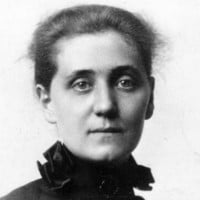 Jane Addams was honored with the Nobel Peace Prize in 1931 for her founding of the Hull House in Chicago and her leadership in the women's suffrage and peace movements. Recognized as the mother of social work, she was a key figure in the early 20th century advocating for women and children's rights.
Jane Addams was honored with the Nobel Peace Prize in 1931 for her founding of the Hull House in Chicago and her leadership in the women's suffrage and peace movements. Recognized as the mother of social work, she was a key figure in the early 20th century advocating for women and children's rights.
 Jane Addams was honored with the Nobel Peace Prize in 1931 for her founding of the Hull House in Chicago and her leadership in the women's suffrage and peace movements. Recognized as the mother of social work, she was a key figure in the early 20th century advocating for women and children's rights.
Jane Addams was honored with the Nobel Peace Prize in 1931 for her founding of the Hull House in Chicago and her leadership in the women's suffrage and peace movements. Recognized as the mother of social work, she was a key figure in the early 20th century advocating for women and children's rights.
19 Theodore Roosevelt
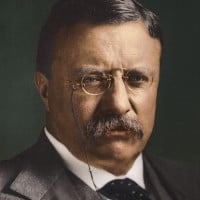 Theodore Roosevelt received the Nobel Peace Prize in 1906 for his mediation in the Russo-Japanese War, leading to the Treaty of Portsmouth. His intervention was pivotal in ending the conflict and showcased his commitment to international diplomacy.
Theodore Roosevelt received the Nobel Peace Prize in 1906 for his mediation in the Russo-Japanese War, leading to the Treaty of Portsmouth. His intervention was pivotal in ending the conflict and showcased his commitment to international diplomacy.
 Theodore Roosevelt received the Nobel Peace Prize in 1906 for his mediation in the Russo-Japanese War, leading to the Treaty of Portsmouth. His intervention was pivotal in ending the conflict and showcased his commitment to international diplomacy.
Theodore Roosevelt received the Nobel Peace Prize in 1906 for his mediation in the Russo-Japanese War, leading to the Treaty of Portsmouth. His intervention was pivotal in ending the conflict and showcased his commitment to international diplomacy.
20 Al Gore
 Al Gore was awarded the Nobel Peace Prize in 2007, jointly with the Intergovernmental Panel on Climate Change (IPCC), for their efforts to build up and disseminate greater knowledge about man-made climate change, and to lay the foundations for the measures that are needed to counteract such change. His work has had a lasting impact on global environmental policy.
Al Gore was awarded the Nobel Peace Prize in 2007, jointly with the Intergovernmental Panel on Climate Change (IPCC), for their efforts to build up and disseminate greater knowledge about man-made climate change, and to lay the foundations for the measures that are needed to counteract such change. His work has had a lasting impact on global environmental policy.
 Al Gore was awarded the Nobel Peace Prize in 2007, jointly with the Intergovernmental Panel on Climate Change (IPCC), for their efforts to build up and disseminate greater knowledge about man-made climate change, and to lay the foundations for the measures that are needed to counteract such change. His work has had a lasting impact on global environmental policy.
Al Gore was awarded the Nobel Peace Prize in 2007, jointly with the Intergovernmental Panel on Climate Change (IPCC), for their efforts to build up and disseminate greater knowledge about man-made climate change, and to lay the foundations for the measures that are needed to counteract such change. His work has had a lasting impact on global environmental policy.
21 Mikhail Gorbachev
 Mikhail Gorbachev received the Nobel Peace Prize in 1990 for his significant contributions to the reduction of international tension and the initiation of major disarmament talks with the United States during the Cold War. His policies of glasnost (openness) and perestroika (restructuring) were instrumental in ending the Cold War.
Mikhail Gorbachev received the Nobel Peace Prize in 1990 for his significant contributions to the reduction of international tension and the initiation of major disarmament talks with the United States during the Cold War. His policies of glasnost (openness) and perestroika (restructuring) were instrumental in ending the Cold War.
 Mikhail Gorbachev received the Nobel Peace Prize in 1990 for his significant contributions to the reduction of international tension and the initiation of major disarmament talks with the United States during the Cold War. His policies of glasnost (openness) and perestroika (restructuring) were instrumental in ending the Cold War.
Mikhail Gorbachev received the Nobel Peace Prize in 1990 for his significant contributions to the reduction of international tension and the initiation of major disarmament talks with the United States during the Cold War. His policies of glasnost (openness) and perestroika (restructuring) were instrumental in ending the Cold War.
22 Ellen Johnson Sirleaf
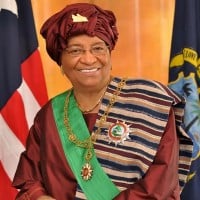 Ellen Johnson Sirleaf, awarded the Nobel Peace Prize in 2011 jointly with Leymah Gbowee of Liberia and Tawakkol Karman of Yemen, was recognized for her non-violent struggle for the safety of women and for women's rights to full participation in peace-building work. As the first elected female head of state in Africa, her leadership helped secure peace in Liberia after years of civil war.
Ellen Johnson Sirleaf, awarded the Nobel Peace Prize in 2011 jointly with Leymah Gbowee of Liberia and Tawakkol Karman of Yemen, was recognized for her non-violent struggle for the safety of women and for women's rights to full participation in peace-building work. As the first elected female head of state in Africa, her leadership helped secure peace in Liberia after years of civil war.
 Ellen Johnson Sirleaf, awarded the Nobel Peace Prize in 2011 jointly with Leymah Gbowee of Liberia and Tawakkol Karman of Yemen, was recognized for her non-violent struggle for the safety of women and for women's rights to full participation in peace-building work. As the first elected female head of state in Africa, her leadership helped secure peace in Liberia after years of civil war.
Ellen Johnson Sirleaf, awarded the Nobel Peace Prize in 2011 jointly with Leymah Gbowee of Liberia and Tawakkol Karman of Yemen, was recognized for her non-violent struggle for the safety of women and for women's rights to full participation in peace-building work. As the first elected female head of state in Africa, her leadership helped secure peace in Liberia after years of civil war.
23 Dag Hammarskjöld
Dag Hammarskjöld was posthumously awarded the Nobel Peace Prize in 1961 for his role as the second Secretary-General of the United Nations, where his efforts in various international crises significantly advanced the cause of peace. His leadership and mediation were instrumental in addressing conflicts during the Cold War era.
24 Wangari Maathai
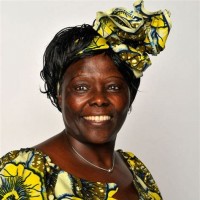 Wangari Maathai received the Nobel Peace Prize in 2004 for her contribution to sustainable development, democracy, and peace. She was the founder of the Green Belt Movement in Kenya, an environmental organization that supports women in planting more than 30 million trees on their farms and school grounds to combat deforestation and environmental degradation.
Wangari Maathai received the Nobel Peace Prize in 2004 for her contribution to sustainable development, democracy, and peace. She was the founder of the Green Belt Movement in Kenya, an environmental organization that supports women in planting more than 30 million trees on their farms and school grounds to combat deforestation and environmental degradation.
 Wangari Maathai received the Nobel Peace Prize in 2004 for her contribution to sustainable development, democracy, and peace. She was the founder of the Green Belt Movement in Kenya, an environmental organization that supports women in planting more than 30 million trees on their farms and school grounds to combat deforestation and environmental degradation.
Wangari Maathai received the Nobel Peace Prize in 2004 for her contribution to sustainable development, democracy, and peace. She was the founder of the Green Belt Movement in Kenya, an environmental organization that supports women in planting more than 30 million trees on their farms and school grounds to combat deforestation and environmental degradation.
25 Jimmy Carter
 Jimmy Carter was awarded the Nobel Peace Prize in 2002 for his decades of untiring effort to find peaceful solutions to international conflicts, to advance democracy and human rights, and to promote economic and social development. Through The Carter Center, he has worked to improve global health, mediate conflicts, and ensure electoral integrity worldwide.
Jimmy Carter was awarded the Nobel Peace Prize in 2002 for his decades of untiring effort to find peaceful solutions to international conflicts, to advance democracy and human rights, and to promote economic and social development. Through The Carter Center, he has worked to improve global health, mediate conflicts, and ensure electoral integrity worldwide.
 Jimmy Carter was awarded the Nobel Peace Prize in 2002 for his decades of untiring effort to find peaceful solutions to international conflicts, to advance democracy and human rights, and to promote economic and social development. Through The Carter Center, he has worked to improve global health, mediate conflicts, and ensure electoral integrity worldwide.
Jimmy Carter was awarded the Nobel Peace Prize in 2002 for his decades of untiring effort to find peaceful solutions to international conflicts, to advance democracy and human rights, and to promote economic and social development. Through The Carter Center, he has worked to improve global health, mediate conflicts, and ensure electoral integrity worldwide.8Load More
PSearch List